Like us humans, dogs can’t choose the circumstances into which they’re born. Where and with whom a dog ends up is basically luck of the draw, whether with a loving, responsible guardian or an “owner” who simply views them as property. In essence, dogs are at the mercy of the species that domesticated them thousands of years ago, and with no control over their own destiny, the best they can hope for is to end up in good hands.
Like many less fortunate dogs throughout the globe, Django came into the world with the odds stacked against him. In fact, from the moment he took his first breath his future already looked bleak. Born into a dog farm outside of Seoul, South Korea, the Tosa mastiff puppy was just another “meat dog” doomed to a wretched existence inside a barren metal cage, where he would remain until he grew large enough to be sold and slaughtered for his meat. Although the pitiful conditions at the farm could rival any of the western world’s worst puppy mills, Django’s time there would actually be the best part of what was to be his short and miserable life.
Each year, approximately 2.5 million dogs are bred and slaughtered for human consumption in South Korea. Unlike in China and other parts of Asia, Korea’s dog meat trade primarily relies on the commercial farming of dogs to supply the country’s demand for dog meat. It is a massive, unregulated industry, with an estimated 10,000-17,000 farms scattered throughout the country varying in size from small backyard operations to large-scale factory farming systems. On these farms, dogs live in abject squalor, their daily lives full of fear, boredom, hunger and disease. Since there are no legal protections for meat dogs, farmers, traders, and butchers are free to inflict cruelty and abuse with impunity.
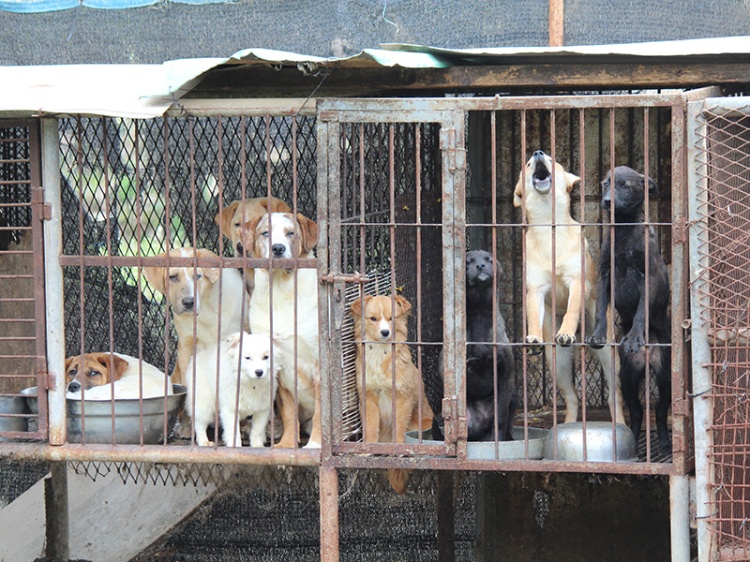
A dog farm in Busan, South Korea. In the country there is a widely-held belief that there are two ‘types’ of dogs: “meat dogs” for human consumption, and “pet dogs,” consisting of purebred dogs, for companionship. Dogs categorized as “meat dogs” are widely perceived to be dirty, stupid and soulless, which has resulted in these dogs being treated as animals that don’t deserve consideration, protection or value. This perception is held by many and reflected by the attitudes of the industry, public and government. (Photo courtesy Change For Animals Foundation)
But lucky for Django, he happened to be in the right place at the right time. A small group of rescuers had arrived at the dog farm, among them a dedicated young activist named Lola Webber. After years of researching the Korean dog meat trade with the long-term intention of bringing it to an end, she’d recently co-founded the Change For Animals Foundation, a small international animal welfare organization that works to create positive and lasting change for animals throughout the world through research, advocacy, campaigns, and strategic partnerships with other like-minded NGOs.
With the opportunity to save one dog that day, the group set their sights on Django’s cage, where he and his litter mates stared back at the strange humans with wide, frightened eyes.
At only four months old, the puppies were already terrified of humans, so when one of the rescuers climbed into the cage and crawled toward them, they quickly scampered away. The touch of a human only meant bad things, so when Django felt strange hands encircling his body, he froze. Enfolded by warm, caring arms, he was carried out of the farm, where a whole new world awaited him. Watch his touching rescue video here.
“We named him Django after Quentin Tarantino film, “Django Unchained,” (because) he’s Django uncaged,” Lola explained. “Though he didn’t know it at the time, he was to become CFAF’s ambassador for our anti-dog meat campaigns. He would show the world that all dogs, regardless of breed or place of birth, are equally worthy of compassion and respect. In Korea, there’s a belief that ‘meat dogs’ are stupid and soulless, that it’s their ‘destiny’ to be slaughtered for consumption. Through Django, we wanted to disprove the notion that ‘meat dogs’ are different than ‘pet dogs,’ a myth that has been deliberately promulgated by the Korean dog meat industry to appease a population where pet ownership is rising exponentially. It’s no dog’s destiny to suffer.”
After months of intensive veterinary care to heal his sickly little body, Django flew to Singapore to live with Lola and her daughter, Leila. Once his month in quarantine was up, he was brought to his new home, where he would soon learn the joys of being a dog.
“Django took to his life of freedom immediately,” said Lola. “He fit straight in with my other two rescue dogs, (and) everything was so exciting to him. He found absolute joy in what the world had to offer, such as smelling flowers, chasing birds, being hugged, snoozing in the sunshine, and finding the strength to run, with his beautiful chops flailing around and his gangly, uncoordinated legs charging forward! We loved him immediately, more than words could ever do justice.”
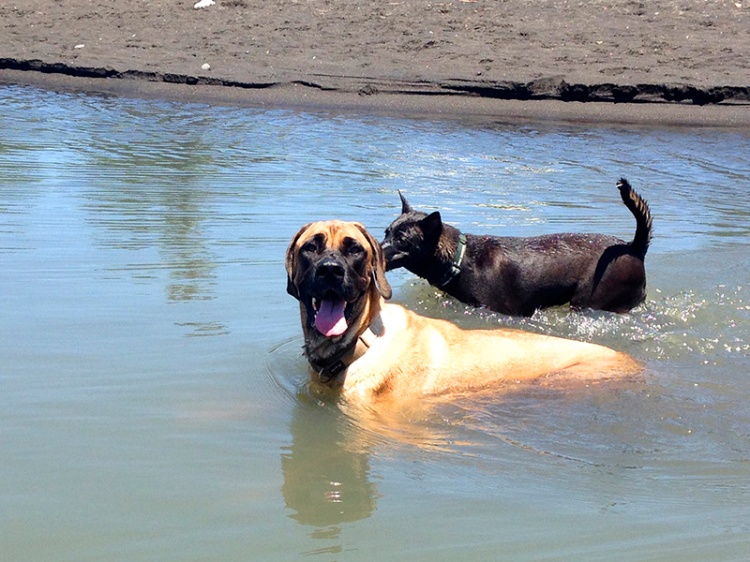
Django enjoying a swim with one of his rescue siblings. (Photo courtesy Lola Webber)
Sadly, Django’s Cinderella story isn’t a common one for dogs trapped in the meat trade. Approximately 10 million are consumed every year throughout Asia, which is why CFAF has made ending this barbaric industry one of its biggest objectives, a lofty goal they’re determined to attain.
“Change For Animals Foundation was founded in 2012 by myself and three friends – Harry Eckman, Suzanne Rogers and Carla Brown – with the shared vision of creating an organization that would never lose sight of what it believed in, that all animals matter,” Lola explained. “We’re a small organization with minimal funding, so we work hard to ensure that other organizations that have additional resources and expertise can take on pieces of work that we can’t. There are no egos at CFAF, just a burning desire for the suffering of the millions of dogs caught up in the meat trade to end, so we support all efforts by other groups and individuals who share our dream.”
While some anti-dog meat activists make a practice of criticizing cultures and governments in a losing effort to shame them into banning the trade, CFAF takes a more proactive, sustainable approach – working with the industry they’re trying to change. This tactic has included meeting and establishing relationships with a growing network of dog farmers that want to leave the industry but simply don’t have the resources to do so.
“When we sat down and talked with the farmers we realized we actually want the same thing – they want out of the dog meat trade and we want the dog meat trade to end,” Lola explained. “I feel so much anger about what the trade encourages, that it relies on the suffering of dogs, but the more time you spend with the dog farmers, the more you realize that they aren’t monsters, they’re just people who in their minds are making a living. So instead of trying to shut down farms with no consideration for the people whose livelihoods rely on them, we’ve worked on building relationships based on trust and respect so we can actually facilitate change. And that’s where we need the bigger organizations that have the resources and expertise to come in and make change happen.”
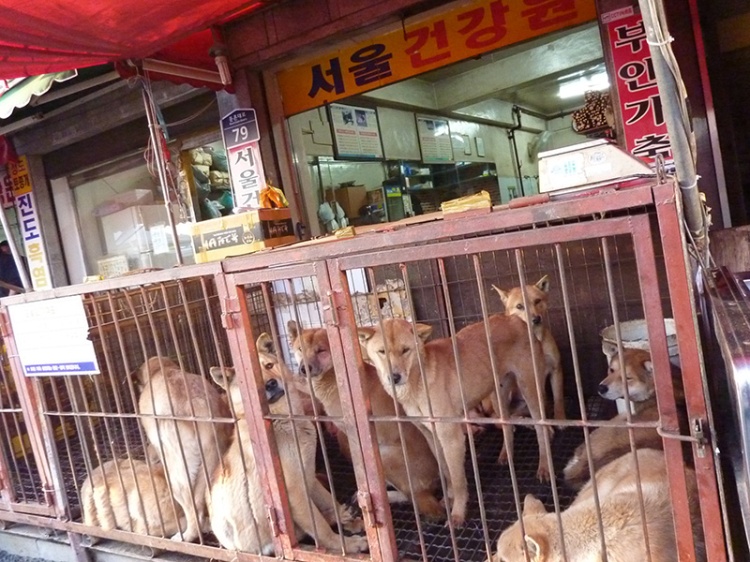
There are many dog meat markets throughout Korea, including Moran Market, the largest and most infamous, located southeast of Seoul, and Gupo Market in Busan, the country’s second-largest city. Alongside the significant animal welfare concerns associated with the dog meat industry, a mounting body of evidence suggests that the production and consumption of dog meat poses a substantial risk to human health, including the spread of the rabies virus. (Photo courtesy Change For Animals Foundation)
Humane Society International certainly has the funding, expertise, marketing reach, and manpower to get the job done. With the support of CFAF, HSI launched a dog farm conversion campaign in late 2014 that not only helps farmers transition into more humane forms of agriculture but also rescues and rehomes the dogs with loving families in the U.S. and Canada. So far, CFAF has assisted HSI with five dog farm closures, a campaign that has been incredibly well-received across Korea and around the globe.
Meanwhile, other anti-dog meat groups including Free Korean Dogs, Animal Hope & Wellness Foundation, and Korean activist Nami Kim have followed suit by closing several dog farms throughout the country. And while the Korean government has yet to step up to the plate and ban the trade, these inspiring campaigns are a positive sign that a death knell could soon be tolling for the country’s dog meat trade.
“As pet ownership continues to rise exponentially in Korea and throughout the region, people’s perceptions of dogs and other animals are changing,” Lola said. “We are also seeing a change of heart in those involved in the industry – dog meat traders, farmers, and restaurant owners. Of all the farmers and traders I have met, not one of them has shown pride in their job, whilst every single one of them has expressed remorse for the dogs who’ve suffered at their hands, resolutely declaring that they are ready to leave the industry but need help to do so. People throughout Asia care deeply and passionately about this issue, and as international organizations, our role is to support change from within these countries as well as those on the frontline.”
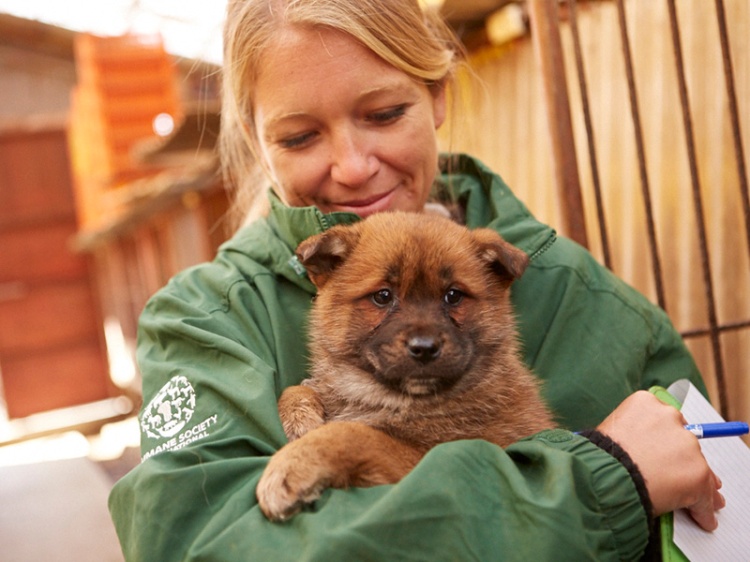
Lola cuddles one of the lucky pups rescued from a dog farm by Humane Society International, which CFAF has assisted in executing its incredibly successful dog farm conversion campaign. (Photo courtesy HSI)
Thanks to local groups, individuals, and international support, animal rights is the fastest growing civic movement in Korea. Although the country is still home to thousands of dog meat restaurants, only two years ago one of its longest-running dog meat establishment closed after 33 years.
Yet despite the many green shoots of change, an unfortunate summer tradition continues in Korea – boknal or “bok” days (or “dog days” of summer), in which Koreans consume dog meat soup, “boshintang,” on the three hottest days of the lunar calendar (this year’s bok days fell on July 17 and 27, and today, August 16). The (unfounded) belief is that dog meat cools the blood and helps the body fight off the debilitating effects of heat and humidity. But according to recent media reports, the demand for boshintang is on the wane, the direct result of growing anti-cruelty sentiments and activism within the country, a movement that picked up speed this year.
“The boknal days have come and gone over the years, and in the past, the protest numbers were always very small and the coverage was minimal,” Lola said. “Whereas this year, all of a sudden you have protests through central Seoul with over 100 people marching and passionately voicing their opinions, large demonstrations that are making the 9 o’clock news on the main national news channels. The traders are reporting very bad business over the boknal days, so they’re feeling the pressure. We just need the government to feel the pressure, too.”
Check out this beautiful video of Lola and a few CFAF volunteers rescuing six dogs from a dog meat farm in May 2016 (video courtesy Martyn Stewart):
With the next Winter Olympics slated for Pyeongchang in 2018, the global spotlight will be focused on South Korea. This will afford CFAF and other groups a golden opportunity to shine a light on the dog meat trade, raise international and national awareness, and support local and international groups and activists in leveraging the event to continue lobbying for legislative change.
“I think (activists in Korea) are really finding their voice and confidence,” Lola said. “I don’t know if part of that has come from the Yulin dog meat festival, where it’s become such a global thing with celebrities around the world speaking up about it. Yulin is one tiny place representing a relatively small number of dogs when you look at the whole scale of things, but it’s become a symbol and representation of what the dog meat industry is – cruel, dirty, and not in line with any of these cultures whatsoever. This is not an issue of ‘cultural’ or ‘personal’ preference, this is an issue of inherent and inexcusable cruelty.”
She continued, “By activists throughout the region seeing what’s gone on in Yulin, I believe it’s empowered others to speak out against something that is defended by many as ‘tradition’ or ‘culture,’ because to stand up against that takes a brave person. These people have always been there, but they’re finding their strength and courage, and they will be the ones who will ultimately end dog meat in South Korea and throughout the region.”
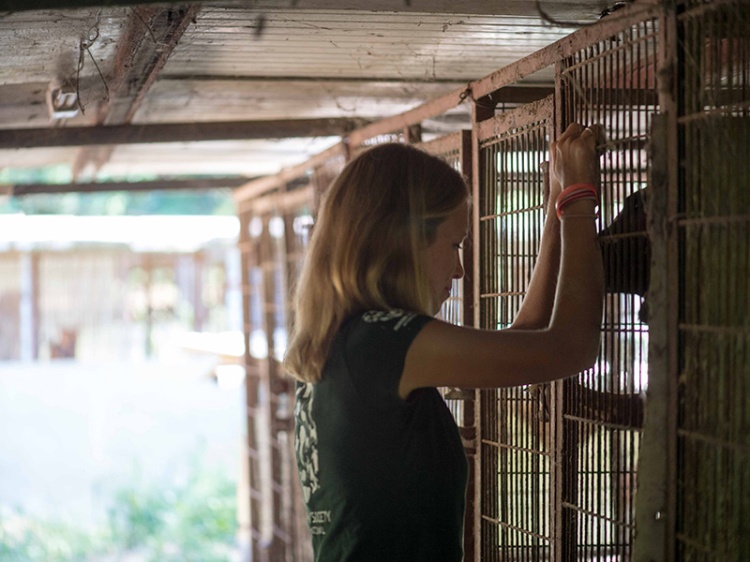
Lola at one of the dog farms HSI shut down. Although the majority of dogs sold and slaughtered for meat in Korea come from farms, the industry is heavily supplemented with ‘excess dogs’ produced for the pet dog trade. Many dogs that are no longer wanted as pets are sold or given to traders and farmers, and it is common to see many different breeds of dogs at farms and markets, some still wearing collars. (Photo courtesy Martyn Stewart)
Three years after his rescue from the dog farm, Django has grown into a big, happy dog enjoying life with his doting family in Bali, Indonesia. As evidenced by his constantly wagging tail, he seems to have forgiven the world for the terrible cruelty he endured in his early puppyhood.
“Watching him swim in the sea and play with my other dogs, his giant gangly legs charging along with that huge Tosa grin on his face, brings me more joy than words could ever do justice,” Lola said glowingly. “He finds joy and happiness in everything and is the goofiest, most playful soul I’ve ever met. There’s nothing better than coming home to him after being in Korea, but it also just makes it so much harder for me at the same time because (this campaign has become) so personal to me.”
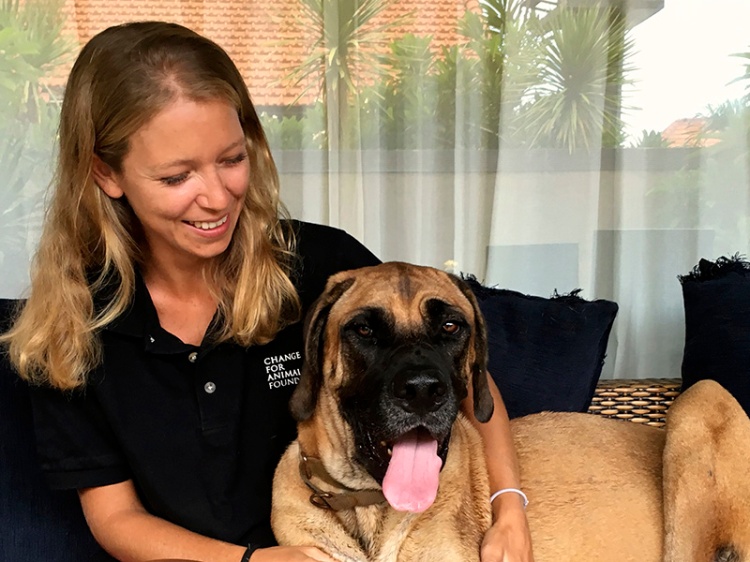
Lola Webber and her beloved Django. A lifelong animal lover and advocate, Lola has dedicated her entire life to helping animals. Born in Brussels to British parents, she grew up with dogs and was already an animal activist by the time she was six years old. (Photo courtesy Change For Animals Foundation)
Although Lola remains haunted by the faces of the dogs she couldn’t save from the countless farms and markets she’s visited over the years in Korea, she’s learned to channel her remorse into a raw determination to keep fighting until the trade is no more. Whether she’s able to help save one dog or hundreds of dogs, change one mind or thousands of minds, it’s those little victories that keep her going. Meanwhile, Django is there to remind her of why she returns to the battlefield again and again, in the hope that someday, all people will recognize animal cruelty as having no place in our 21st century global society.
“Django is the love of my life, and I can’t remember life without him,” she said. “After witnessing too many horrors and being so helpless to stop the brutal treatment of dogs, I needed to love one dog enough for all those I’d left behind. His ability to love so generously and unconditionally, despite everything he went through, never ceases to bring me to tears – he breaks and heals my heart in equal measures. Knowing dogs just like him continue to suffer on dog meat farms and in slaughterhouses and markets hurts so deeply, but it also keeps that fire of determination burning fiercely inside of me. I always think, if everyone could meet a Django and see him the way I do, the industry would end tomorrow.”
For more information about Change For Animals Foundation, please visit their website or Facebook page.
Want to read about another beautiful dog farm dog who got a second chance at life? Check out Pocket’s story here.
“Out of suffering have emerged the strongest souls; the most massive characters are seared with scars.” – Kahlil Gibran
The piece about Lola Webber’s work is excellently written, giving the reader not only the intense sadness and anger about the South Korean dog meat trade, but just as importantly, a positive outlook from knowing about the good work that is being done with the farmers of this unspeakable industry to help them find other kinds of work, and leave this industry altogether. Plummer’s inclusion of the organizations who assist in the rescue and rehabilitation of these “meat dogs” is a boon to all who wish to assist financially or through adoption. A masterful article….
This practice must be stopped if we are to live in a world where animals are treated with compassion and dignity…
LikeLike
Thank You for your support And i Want help so much great 💜 Respect
LikeLike